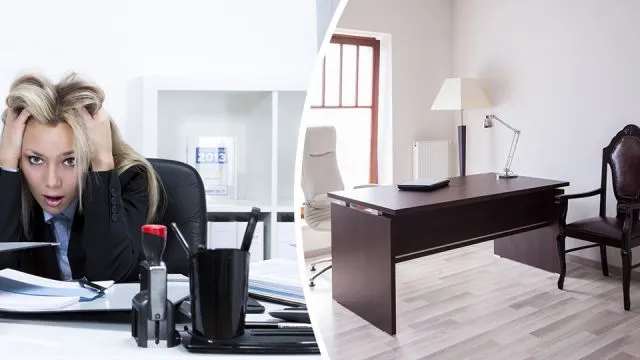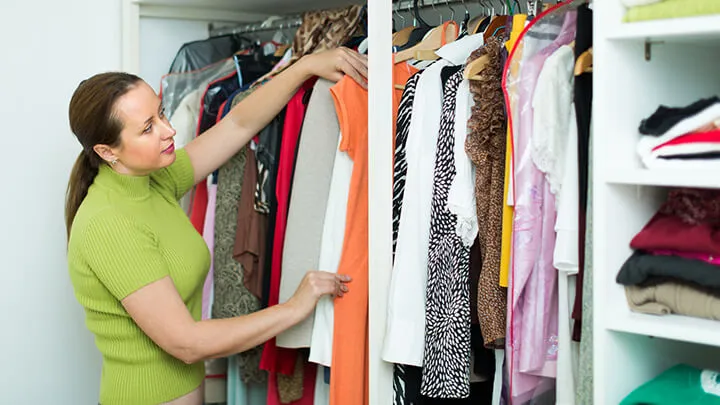
- Share on Facebook15
- Share on Pinterest
- Share on Twitter
Clutter is a bane of my existence. I don’t do well when it’s around, and I take all necessary and reasonable steps to eradicate it if it arises. There is a reason behind my war on clutter: it stresses me out, makes things difficult to find, and makes me feel like I can’t freely move around an open area. I enjoy moving freely around open areas.
When I was in my early 20s, I briefly lived in a house with three roommates. The dynamic in the house was mostly okay, but one of the roommates was a mechanic who left big piles of tools in various areas of the house. Also, dishes piled up, there were stacks of random items, countertops were littered with knick knacks and the house was not kept especially clean. I take responsibility for my part in the mess — all four of us contributed to it.
As a result of this clutter/mess situation, I never felt fully comfortable in the house. There were areas of it I wouldn’t sit, stand or go. I kept my room very minimal — I think I had two or three small pieces of furniture — and stayed in it often. Today, I keep my home clean, organized and as clutter-free as possible. It’s not always easy, as things tend to pile up in the course of daily life, but my husband and I are both pretty vigilant about minimalism (within reason), and we succeed.
Clutter has negative health consequences
When things are clean and uncluttered, every area of our home feels comfortable. I’m able to walk around without bumping into things. There is room on countertops to set glasses, and everything just feels more open. This “anti-clutter” effect is backed by science. Research has linked a cluttered environment to decreased focus and increased stress. A cluttered kitchen has even been linked to overeating.
I can attest to much of this personally. When things are cluttered on my desk, I find it more difficult to focus. When things are piled up and messy all around, I get stressed. Keeping things clean and organized relieves my stress, thus making me feel more calm and centered. It does take a couple hours out of the already-busy week, but it’s worth it. Think about how great your home would look without piles of stuff everywhere. Picture it… looks and feels nice, doesn’t it?
Here are a few ways to get rid of the clutter:
1. Ditch old clothes

Go through your closets and get rid of everything you haven’t worn in two years. If you need to make exceptions for a “special night” outfit or a costume or two, that’s understandable, but aim to purge pretty much everything that’s not in active use. Don’t forget the linen closets.
2. Go through storage
Go through your basement, attic and any storage areas of your home. Keep only what you actually use. Make a plan to donate the rest. Chances are there are many people out there who would actively enjoy the stuff you have laying around collecting dust.
3. Tackle your kitchen
Go through your pantry and fridge and get rid of any expired food. Organize your spices, oils and dry goods.
4. Go through drawers

These include the drawers in nightstands, dressers and entertainment centers, kitchen drawers, living room drawers… all the drawers in your home. Recycle, donate or toss everything you don’t need. File away or recycle that old mail. Keep only what you need in those drawers. Allow yourself the room in each drawer to add more important things — and don’t overstuff.
5. Clear off those countertops
Donate any knick knacks that are unloved and unneeded. Recycle old papers. Put the change in a change jar. File everything else away where it belongs.
6. Survey your overall space
Walk through every room of your home and see if there’s anything else that is cluttering it up. Address each obstacle as you come to it, leaving an organized area in your wake. When you’re done doing that, walk around the outside of your home. Address any clutter in your yard, garage and shed.
7. Photograph sentimental items
If you have a lot of sentimental items piled up, and don’t know what to do with them, science says that taking photographs may help. A new study published in the Journal of Marketing has found that people have an easier time giving up their sentimental possessions if they are able to take a photo of them first — or do something else to preserve its memory in some way. According to Ohio State University’s Rebecca Reczek:
“What people really don’t want to give up is the memories associated with the item. We found that people are more willing to give up these possessions if we offer them a way to keep the memory and the identity associated with that memory.”
The study involved Penn State University students who participated in a donation drive. One campaign suggested that students photograph items before donating, and the other simply encouraged them to donate. The first campaign received 613 donations, while the second received 533. Not a huge difference, but still significant. This suggests that at least some items were easier for people to let go of if they got to keep a photo.
The researchers involved in the study hope that new information increases the number of donations that are made to people in need. It’s a worthy goal, and also a great motivation to let go of those items that you may have been hanging onto for too long. Someone else may give them the attention they deserve. Think about it!
After you’re done with your decluttering process, walk back through your home, open the windows, look around and breathe. Feel better?
— Tanya Mead
- Share on Facebook15
- Share on Pinterest
- Share on Twitter

